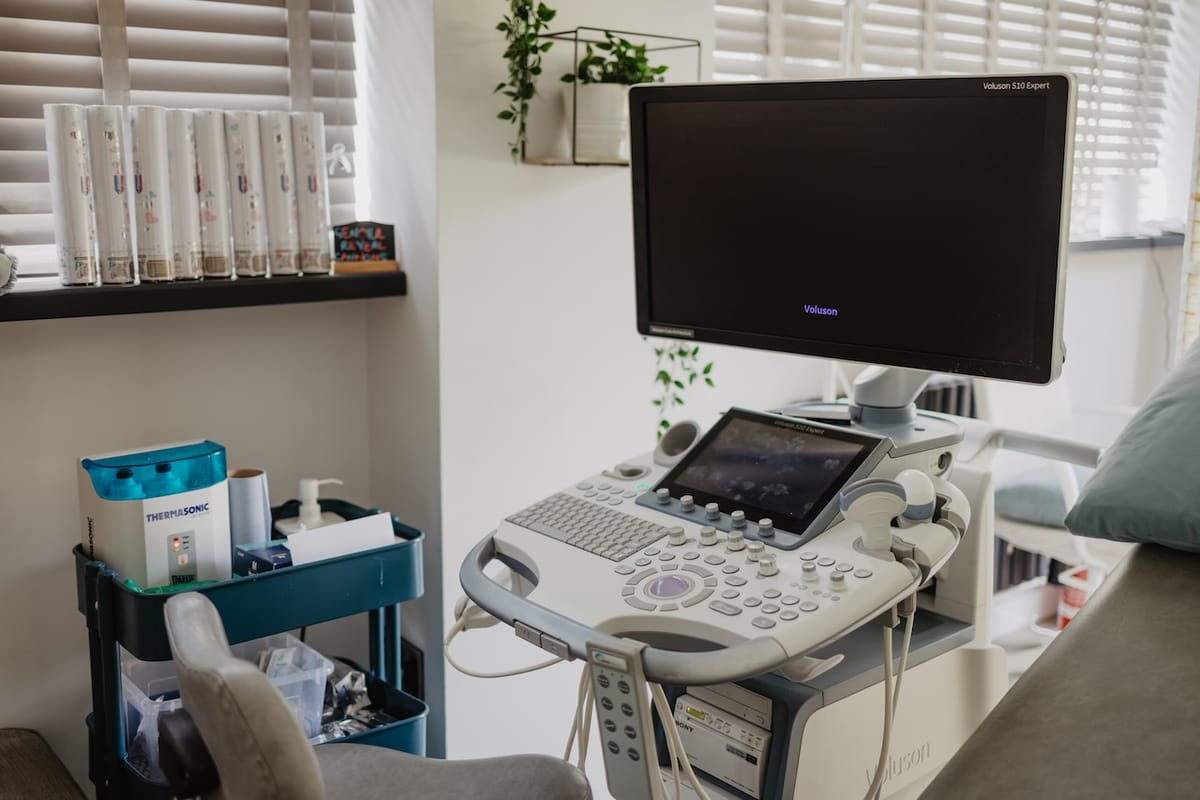Ultimate Guide to Pregnancy Ultrasound Scans (Types & Timing)

Understanding the types of pregnancy scans, when they happen, and why they matter
Feeling confused about your pregnancy scans? You're not alone.
Many expectant parents — especially first-time mums — feel overwhelmed trying to understand all the different scans, what they’re for, and when they’re supposed to happen. Should you be worried if one is late? Are you missing anything important?
As a registered obstetric sonographer, I’ve supported thousands of women through their pregnancies. Whether you’re newly pregnant or further along and unsure what comes next, this guide will walk you through the types of pregnancy scans and the typical pregnancy ultrasound schedule, so you can feel more confident and informed.
🗓 When do pregnancy scans happen, and why?
There are several ultrasound scans offered throughout pregnancy. The standard schedule depends on where you live, your medical history, and whether you choose public or private care.
Most women will have at least two key scans on the NHS or through public healthcare — the dating scan and the anomaly scan. Many also choose optional private scans for reassurance or early information.
🧭 What are the different types of pregnancy scans?
Below is a breakdown of the most common scan types you might be offered or choose to book. Each serves a different purpose:
1. Early Pregnancy Scan (6–10 weeks)
Also called a “viability scan” or “early reassurance scan”
- Purpose: Confirm a heartbeat, location of pregnancy (rule out ectopic), and number of babies
- How it’s done: Often transvaginal before 8 weeks, especially if the uterus is still tucked behind the bladder
- Who offers it: Private only in most countries unless there’s a medical concern
2. Dating Scan (11–14 weeks)
- Purpose: Measure your baby’s size (CRL – Crown Rump Length) to estimate your due date
- Optional additions: May include nuchal translucency (NT) measurement for screening chromosomal conditions like Down syndrome
- Who offers it: Routinely offered in NHS/public care systems, also available privately
3. Nuchal Translucency Screening (10–14 weeks)
Often done during the dating scan window
- Purpose: Combined with a blood test, it screens for the likelihood of conditions like Trisomy 21 (Down syndrome)
- Who offers it: NHS or private providers
4. Gender Scan (16–18 weeks)
- Purpose: Reveal baby's sex earlier than the anomaly scan
- Who offers it: Private only — not medically necessary, but popular for bonding
5. Anatomy Scan / Anomaly Scan (18–22 weeks)
Also called the “20-week scan”
- Purpose: In-depth check of baby’s heart, brain, spine, kidneys, limbs, and organs; placenta location and fluid level
- Who offers it: Routinely offered in public care; also available privately
This scan can be emotionally charged. It’s a key point where structural abnormalities may be picked up — and where reassurance is often needed.
6. Growth Scan (28+ weeks)
- Purpose: Assess baby’s growth (EFW – Estimated Fetal Weight), fluid levels, blood flow (Doppler), and placenta function
- Who offers it: Offered in NHS/public systems only if clinically needed, but always available privately
7. Presentation Scan (36+ weeks)
- Purpose: Confirm baby’s position (head-down vs breech), amniotic fluid levels, and placental position before labour
- Who offers it: Private clinics; sometimes offered in hospital antenatal clinics close to due date
8. 3D/4D Bonding Scans (24–32 weeks)
- Purpose: Provide real-time, often keepsake-quality images of baby’s face and movements
- Who offers it: Private only
These scans are not medical — but can offer huge reassurance and connection, especially in pregnancies following loss.
💬 Do I have to have all these scans?
No scan is mandatory — even the routine NHS ones.
However, the dating and anomaly scans are recommended as they provide vital medical information. Additional scans (private or NHS) may be helpful if:
- You have a high-risk pregnancy
- You've had previous complications
- You simply want extra reassurance
If you feel pressured, remember: it’s always okay to ask questions or say no. You're in control.
⚖️ What’s the difference between NHS and private scans?
This is one of the most common sources of confusion for parents — especially when your NHS appointment is 10 minutes long, but your friend had a relaxing 30-minute private session.
Here’s how they compare:
| Feature | NHS/Public Scan | Private Scan |
|---|---|---|
| Purpose | Clinical check only | Reassurance + clinical check |
| Length | 5–15 minutes | 20–45 minutes |
| Imaging | 2D only | 2D, 3D, 4D (optional) |
| Who explains results | Doctor/Midwife later | Sonographer during scan |
| Photos/Videos | Often minimal | Usually included |
😰 What if I feel anxious before a scan?
Completely normal. Many women feel tense walking into a scan room — especially after:
- A previous loss
- Fertility struggles
- An unexpected finding on a past scan
- Just general pregnancy anxiety (also totally valid!)
You’re not alone in this.
Here’s what can help:
- Bring a partner, friend, or someone calming
- Ask the sonographer to talk you through the screen
- Take slow breaths if baby’s not in the right position — they often move with time
- Have a follow-up plan in mind if the scan leaves you uncertain
And remember: if a scan leaves you feeling more confused than reassured, I offer Clarity Calls — a one-on-one space to talk through your report with a calm, qualified expert.
🧠 Quick Definitions
- CRL: Crown-rump length – baby’s head-to-bottom measurement
- NT: Nuchal translucency – fluid behind baby’s neck, measured for screening
- EFW: Estimated fetal weight – used in third trimester growth scans
- BPD, FL, HC, AC: Key head/body measurements used to track baby’s development
- Placenta previa: Placenta covering the cervix — often moves later
- Presentation: Baby’s position in the uterus (e.g., breech, head-down)
🙋♀️ FAQs – Expert Answers to Common Scan Questions
How many scans will I get during pregnancy?
In most NHS/public systems, two are standard — a dating scan and an anomaly scan. If you're high risk or have concerns, more may be offered. You can also book private scans anytime.
Is it safe to have extra scans?
Yes — when performed by trained professionals, ultrasound is considered safe. Still unsure? See: Are Extra Ultrasounds Safe?
Can I choose when to have private scans?
Yes. Private scans are flexible — you can book for reassurance, bonding, or additional medical insight. Read more: When to Get Each Pregnancy Scan.
What if I don’t understand my scan results?
You're not alone. Many reports are full of abbreviations and lack explanation. You can:
- Ask your provider
- Request a written explanation
- Or book a Clarity Call with a qualified sonographer
Free Pregnancy Scan Timeline
For a visual overview of this guide - and a handy glossary to help you interpret your scan reports - download our free pregnancy scan timeline.
